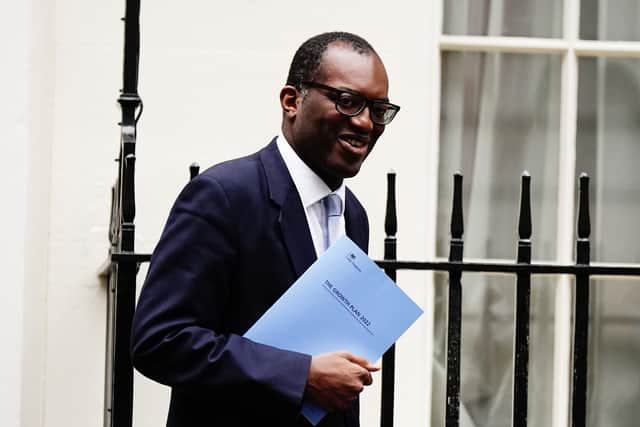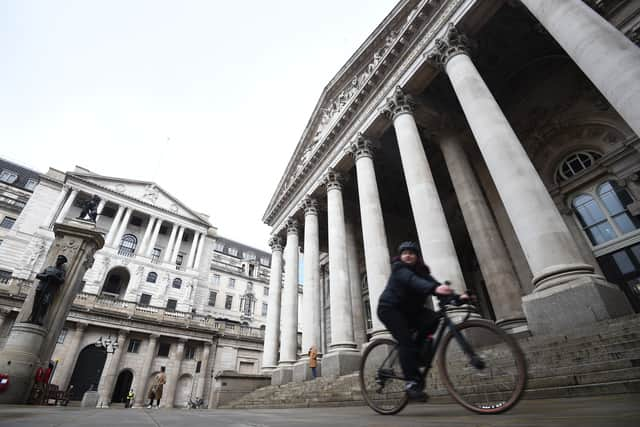What is the bankers’ bonus cap? Why has it been lifted in mini budget 2022 - and what did Kwasi Kwarteng say
and live on Freeview channel 276
Kwasi Kwarteng has delivered a mini budget today (Friday 23 September) designed to help tackle the cost of living crisis and avert a UK recession.
It included a swathe of tax cuts, including: a national insurance reversal, an effective stamp duty cut and the scrapping of a planned hike in corporation tax.
Advertisement
Hide AdAdvertisement
Hide AdThe government spending plans come as Liz Truss has sought to promote a trickle down economic agenda that aims to make the country more prosperous. The Prime Minister’s critics contest that this idea does not work and stands to benefit the rich more than everyone else.
One of the most heavily criticised policies has been a planned change to rules around bankers’ bonuses. But what did the Chancellor announce - and why is it so controversial?


What is the bankers bonus cap?
The bankers bonus cap is an EU law that the UK was signed up to when it was still part of the bloc. The government transferred it across into its statute book after Brexit.
It was introduced in the wake of the 2008 financial crisis, when unsustainable growth by banks crashed the global economy. Here in the UK, the Gordon Brown Labour government was forced to bail out these financial institutions.
Advertisement
Hide AdAdvertisement
Hide AdThe cap limits the amount of money bankers can be paid on top of their regular salary. It is set at 100% of the banker’s salary - although the amount can be doubled with shareholder approval.


The City of London - where Kwasi Kwarteng used to work - has long been against the cap as they argue meddles with the preferred operating model of investment banks. These businesses prefer to pay lower fixed salaries to their employees that are topped up with performance-related bonuses.
However, those who support the cap argue it keeps banks in check and reins in the City’s greedy impulses.
What did Kwasi Kwarteng say about bankers bonus cap?
In his Mini Budget, Kwasi Kwarteng announced measures he said would promote economic growth. Many of these policy announcements involved business tax cuts.
Advertisement
Hide AdAdvertisement
Hide AdFor example, his predecessor Rishi Sunak’s planned corporation tax hike from 19% to 25% of some company profits has been scrapped in a bid to attract private sector investment into the UK.
But Mr Kwarteng has also moved to de-regulate the UK economy through low-tax investment zones and scrapping the bankers bonus cap. The Chancellor said the axing of this limit would benefit the UK economy by attracting banks to the UK.
“A strong UK economy has always depended on a strong financial services sector,” he said. “We need global banks to create jobs here, invest in London, and pay taxes in London, not Paris, not Frankfurt, not New York.
“All the bonus cap did was to push up the basic salaries of bankers, or drive activity outside Europe. It never capped total remuneration, so let’s not sit here and pretend otherwise.
Advertisement
Hide AdAdvertisement
Hide Ad“So we’re going to get rid of it. And to reaffirm the UK’s status as the world’s financial services centre, I will set out an ambitious package of regulatory reforms later in the autumn.”


Kwasi Kwarteng has been backed in his decision by the Bank of England. However, this support comes despite the central bank’s governor Andrew Bailey urging for wage restraint to avoid a wage-price spiral - a disputed inflation phenomenon.
Labour said the policy would benefit corporations and the rich to the detriment of working people.
Shadow chancellor Rachel Reeves said: “Bigger bonuses for bankers, huge profits for energy giants, shamelessly shielded by Downing Street, and all the while ministers pile the crushing weight of all of these costs onto the backs of taxpayers.”


Advertisement
Hide AdAdvertisement
Hide AdIndeed, the optics of scrapping bankers’ bonus limits while also tightening universal credit rules - all in the context of a major cost of living crisis - appears to be the biggest problem for the government. The jury remains out on whether the policy itself will attract more investment into the City of London.
A Survation poll of 1,189 British adults taken before the mini budget by the Child Poverty Action Group (CPAG) found just 27% of people supported the idea.
Gary Smith, the general secretary of the GMB union, said: “We need to bring inflation under control and build a modern manufacturing base that creates good jobs at home and enhances our national security.
“Instead the Chancellor has chosen to pour money into the hands of rich multinationals. The Chancellor is tough on care workers’ pay rises and soft on bankers’ bonuses.”
Comment Guidelines
National World encourages reader discussion on our stories. User feedback, insights and back-and-forth exchanges add a rich layer of context to reporting. Please review our Community Guidelines before commenting.
